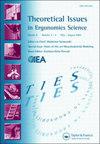Human-agent teaming and trust calibration: a theoretical framework, configurable testbed, empirical illustration, and implications for the development of adaptive systems
IF 1.4
Q4 ERGONOMICS
引用次数: 6
Abstract
Abstract Given new technologies and algorithmic capabilities, human-agent teaming (HAT) is expected to dominate environments where complex problems are solved by heterogenous teams. In such teams, trust calibration is key; i.e. humans and agents working symbiotically, with humans trusting and relying on agents as appropriate. In this paper, we focus on understanding trust-calibration in HATs. We propose a theoretical framework of calibrated trust in HATs. Next, we provide a configurable testbed designed to investigate calibrated trust in HATs. To demonstrate the flexible testbed and our framework, we conduct a study investigating hypotheses about agent transparency and reliability. Results align with research to date, supporting the notion that transparency results in calibrated trust. Further, high transparency yielded more positive affect and lower workload than low transparency. We also found that increased agent reliability resulted in higher trust in the agent, as well as more positive valence. This suggests that participants experienced more engagement with the task when the agent was reliable and presumably trustworthy. We also build on our framework and testbed to outline a research agenda for the assessment of human trust dynamics in HATs and the development of subsequent real-time, intelligent adaptive systems.人工智能体团队和信任校准:理论框架、可配置的试验台、经验说明以及对自适应系统开发的启示
摘要在给定新技术和算法能力的情况下,人工智能体团队(HAT)有望主导由异构团队解决复杂问题的环境。在这样的团队中,信任校准是关键;即人类和制剂共生工作,人类适当地信任和依赖制剂。在本文中,我们重点了解HAT中的信任校准。我们提出了一个HAT中校准信任的理论框架。接下来,我们提供了一个可配置的测试平台,用于研究HAT中经过校准的信任。为了证明灵活的测试平台和我们的框架,我们进行了一项研究,调查了关于代理透明度和可靠性的假设。研究结果与迄今为止的研究一致,支持透明度导致校准信任的观点。此外,与低透明度相比,高透明度产生了更积极的影响和更低的工作量。我们还发现,代理可靠性的提高导致了对代理的更高信任,以及更高的正价。这表明,当代理人可靠且可能值得信赖时,参与者对任务的参与度会更高。我们还以我们的框架和试验台为基础,概述了评估HAT中人类信任动态以及开发后续实时智能自适应系统的研究议程。
本文章由计算机程序翻译,如有差异,请以英文原文为准。
求助全文
约1分钟内获得全文
求助全文

 求助内容:
求助内容: 应助结果提醒方式:
应助结果提醒方式:


